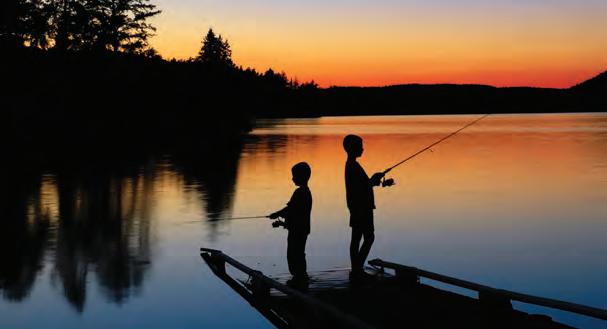
4 minute read
Selling the family cottage? Here’s how to do it right
by Lisa Blake
The emotional and physical exchange that comes with selling the family lake home can be heavy. Use these tips to lighten the load.
Family properties are highly sentimental, carrying generations of memories. How do you let go? And make it all worth it? Lake Homes Realty Associate Broker Cindy Anderson helps us dissect what she calls one of the biggest conflicts she’s seen in the real estate industry.
When it comes to family cottages, what are the biggest seller mistakes you see?
There are so many emotions when a family goes to sell what is basically their memories, and many times emotions cloud their approach.
I often see families list emotionally, going with the agent who sends them calendars over the years and not interviewing to find the best fit. Look at hiring a lake home agent much like you would hire a heart surgeon. Would you hire a heart surgeon based on an ad on a park bench? Experience and market coverage area matters in getting the maximum dollar and best results.
It’s a hot seller’s market. How can a lakefront homeowner use this to their advantage?
List smart. Don’t fall for the strategy of listing low and having a piranha-like feeding frenzy. That creates negative emotions and only benefits the real estate agent’s business; it’s a dog and pony show at the seller’s expense.
Craft a careful market strategy instead. Because our brokerage only sells lake homes, we know the regional market as well as state and national. Only selling to the immediate area leaves hundreds of thousands of dollars on the table. I have story after story of listings that we sold for $50,000, $100,000, $400,000 more than what the sellers were told by others. People may be looking to buy in Michigan, upstate New York, South Carolina, etc. We have our finger on the pulse of the lake home buyer, because that is all we do here in Northern Michigan and throughout the country.
How can sellers prepare?
Estate plan if you can. Suburban houses usually sell every five years, so there is not a big legacy attached. With lake homes, mom and dad built the house when they retired and summer after summer families hang out there. There is a much longer holding period for a lake home. As soon as you buy a lake home, have your exit strategy in place or be thinking about it. Don’t leave it to your kids; be a part of the process early on.
Maintain your property’s septic, exterior and interior. We go through and advise on what repairs or staging are needed to get the best price. You want to be on the edge of where the buyer cannot say no and not have buyers find the repairs.
Make it a family affair. When it comes time to sell, have a family meeting. You may get pushback and that’s okay. Ultimately, it is up to the decision maker. Just make sure voices have been heard.
What are some of the nuances of selling a lake property?
Let’s say the property was built in the 1950s before building codes were invented. You can run into what we call dry wells, which are old-fashioned septics, or you may have water wells where the water has never been tested. Many times, families do not know where the septic field is and find that it is an old field that is leaching into the lake. The property may be a part of an old plat where there has not been a survey in years. We have run into waterfront properties without any waterfront attached. We are prepared for just about anything.
Any insight for buyers?
Our lake homes forecast is based on the representative from the Fed who visited us in October and indicated rates would climb by two points overall by the end of 2022. The forecast also was that sellers will want to take advantage of this market because they are fearful that it will end soon, so we will see more inventory on the water. Inventory is still short, but we are starting to see more waterfront homes come to market at the writing of this article. My prediction is short-term rentals will start to see backlash not only in Northern Michigan, but in all vacation destinations in the U.S. They can be a negative if you have a property next door to one of them; they impact the environment of our inland lakes, and many townships and neighborhoods are moving toward banning them completely. My professional opinion is short-term rentals do not belong on inland lakes. If you are considering buying a short-term rental, I would be very cautious of the environment surrounding your investment— you are a square peg trying to fit into a round hole.
About Cindy Anderson: A Detroit native, Cindy spent every spring, summer and fall on the lakes of Northern Michigan. Fond family memories and deep knowledge of lake living spurred her successful 30-plus-year real estate career in Northern Michigan, for which she’s been honored with more than a dozen awards and designations. When she’s not in her office, Cindy and her husband are making memories with their four children, their spouses and three grandchildren, or cruising the lakes on their 42-foot sailboat.










